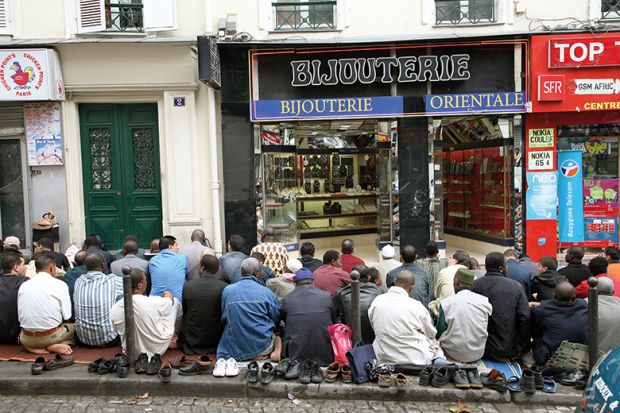Fabien Truong must be a very likeable guy. How else could he have won the trust of so many young Muslim men living in Paris’ housing projects, individuals who are justifiably suspicious of outsiders? His book, Radicalized Loyalties, is an excellent ethnography of Muslim masculinity, showing us the tensions created by the expectations that “real men” have hard bodies, hard demeanours and violent confrontations with the police.
But however likeable Truong may be in person, he is asking his reader to consider a difficult question: what makes a home-grown terrorist? His answer is not particularly reassuring: Western society does, in the way that certain communities are marginalised, particularly through ill-conceived public housing projects, inequitable wealth distribution and lack of employment opportunities.
To make his argument, Truong shares the engaging personalities and life paths of five men he interviewed, and one he never met – Amédy Coulibaly. Amédy killed four Jewish men at the Hyper Cacher in the Porte de Vincennes, in Paris, before being killed by police on 9 January 2015. He is also the main character of Truong’s social ethnography, not the terrorist he became, but rather the younger Amédy whom we come to know through his friends and community members as “a good guy”. His terrorism was not the result of some global network or mental instability. There is an “ordinariness in his trajectory, despite the atrocious nature of the acts committed”. And this ordinariness is quite chilling.
One of the most strikingly juxtapositions of the book is between the personal life of Amédy and that of his childhood friend Adama. Both grew up in the Parisian suburb of Grigny, Truong shows us, where they saw enough violence as children that “killing and dying prematurely were now thinkable prospects”. They were both “bad students” and involved in criminal activities that landed them in prison in their late teens. But while prison was a turning point away from delinquency for Adama, it was where Amédy was radicalised, learned new criminal skills and found jihadist mentors.
The reader will note that Islam is not the originator or driver of this sociological narrative, although it does play a supporting role, as Truong puts it, “as a practical and symbolic route to finding one’s place in the world”. Instead, the culprit is something that he describes as “the second zone”, a state of social contradictions marked by the radical hopelessness that is endemic in the Parisian suburbs. The second zone is the result of fractures at the very heart of French society: republican education’s failure to immigrants, widespread unemployment and poverty, normalisation of incarceration and escalation of violent confrontations between young men and the police.
Trapped in this reality, young Muslim men have two options: find a “meaningful path” or remain stuck in the “circular dead end” of increasing violence, crime and hopelessness. It is under these conditions, according to Truong, that “Islam became a floating political imaginary” that can give meaning to life or, for a jihadist, meaning to death.
Truong does an admirable job describing the social dynamics of a volatile situation, with one exception. Amédy was many things, but he was also black, and the lack of racial analysis in this book is a glaring omission, at least for American readers such as myself. The US has its own version of home-grown terrorism: mass shootings committed by white males who have been radicalised through white supremacy. The role of racism in motivating extreme forms of violence is further evidence for what I take to be one of Truong’s most important claims: we are foolish to blame religion for radicalisation. Indeed, we are foolish to blame “them” – whether Muslims, immigrants or refugees. Radicalisation is a symptom of our failing society, and thus the problem is much bigger, more systematic and harder to solve.
Liz Bucar is the author of Pious Fashion: How Muslim Women Dress (2017) and is currently writing a book on cultural appropriation. She is associate professor of religion at Northeastern University in Boston.
Radicalized Loyalties: Becoming Muslim in the West
By Fabien Truong
Polity
220pp, £55.00 and 16.99
ISBN 9781509519347 and 9781509519354
Published 27 April 2018
请先注册再继续
为何要注册?
- 注册是免费的,而且十分便捷
- 注册成功后,您每月可免费阅读3篇文章
- 订阅我们的邮件
已经注册或者是已订阅?
